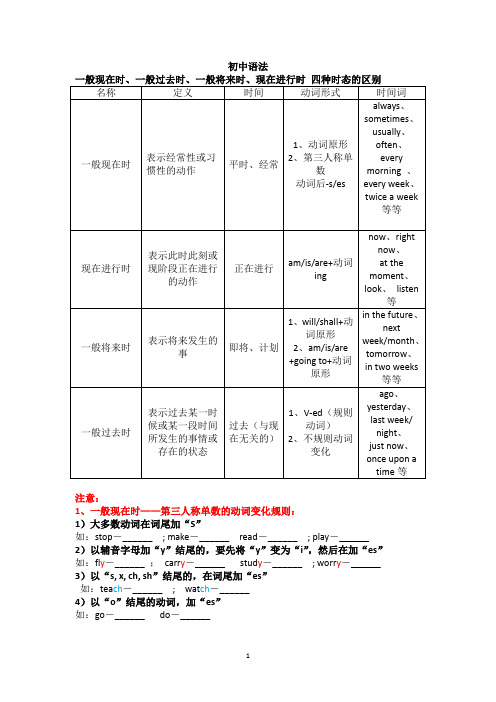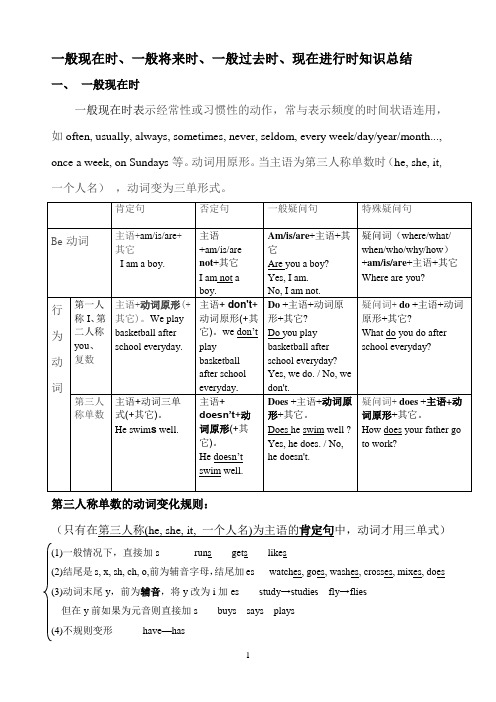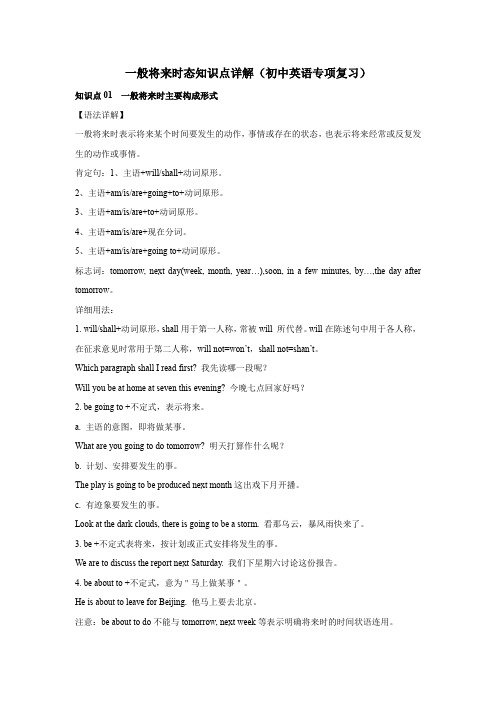九大时态详解_一般将来时
常见九种英语时态

4.表示将来的其它形式
①
②
③ ④ ⑤
⑥
Be going to do sth 表示计划、打算、准备做某事。 Be to do sth 表示拟定或计划中要发生的动作或按之则必 须做的事情。 Be about to do sth 常when从句于连用,表示将要做某事 时,正在这时……。 Be on the way to do sth 表示即将发生的动作。 一般现在时有时也可以表示将来的动作(1、在状语从句中。 2、按计划或安排要发生的动作)。 现在进行时也可以表示安排、计划好要发生的动作,常用 的动词有come, go, leave, start begin, arrive, return等。
① ② ③ ④
3.examples He was in Beijing some years ago. She traveled in Europe last year. When I was at collage, I wrote home once a week. He said he would go for a holiday when he finished his work. He wet to town ,bought some books and visited his daughter last Sunday. You haven’t changed much since we last met. She used to take her dog out for a walk along the river. At night she would hear a long low voice.
注:
① 常与so far, in the past /last…year, week, ②
英语时态一般将来时知识清单总结及用法

英语时态一般将来时知识清单总结及用法1、一般将来时的结构2、一般将来时的结构变化3、知识要点一般将来时的用法(1) 表示将来的动作或状态,常与tomorrow,this evening. next Monday (week,month,year,in ten minutes,someday,in 2018,in the future 等单词或短语连用。
如:They say that the weather will be good tomorrow. 据说明天是好天气。
I shall have supper soon. 我要吃晚饭了。
There will be a class meeting this afternoon. 今天下午开班会。
He will come to see you next Monday . 他下周一会来看你。
(2) 表示即将发生的或最近打算进行的事,常用“be going to+动词原形”。
如:How are you going to spend your holiday ? 你们打算怎样度假?(3) 表示按计划即将发生的动作,常用go,come,start,move,leave等动词的进行时态。
如:He is coming in a minute . 他很快就来。
(4) 表示按计划要发生的事或征求对方意见,或表示安排、命令、预定好要做的事情,常用“be to+动词原形”。
如:The concert is to take place on Friday evening . 音乐会要在下星期五举行。
(5)表示即将发生的动作,或者表示立刻要做的事情,近在眼前的将来,常用“be about to+动词原形”。
如:Hurry up! The train is about to leave . 快点!火车马上要开了○(6) 一般将来时中be going to结构与will的异同点:①be going to结构和will的相同点:都表示将来的动作或状态。
(完整版)一般现在时、一般过去时、一般将来时、现在进行时

初中语法注意:1、一般现在时——第三人称单数的动词变化规则:1)大多数动词在词尾加“S”如:stop-______ ; make-______ read-______ ; play-______ 2)以辅音字母加“y”结尾的,要先将“y”变为“i”,然后在加“es”如:fl y-______ ;carr y-______ stud y-______ ; worr y-______ 3)以“s, x, ch, sh”结尾的,在词尾加“es”如:tea ch-______ ; wat ch-______4)以“o”结尾的动词,加“es”如:go-______ do-______2、现在进行时——动词ing形式的变化规则1.一般动词直接在词尾+ing例:read→______ (读)talk→______(交谈)sing→______(唱歌)2.以不发音e结尾的动词,先去e再加ing例:lik e→______喜欢writ e→______写skat e→______(滑冰)3.以重读闭音节结尾且末尾只有一个辅音字母的动词,双写末尾字母,再加ing 例:sto p→______(停止)ge t→______(得到)4.少数几个以ie结尾的动词,变ie为f再加ing。
例:l ie→______(躺、撒谎)t ie→______(系、捆绑)3、一般过去时——动词的变化规则(1) 一般在动词后加-ed。
如:play-______, offer-______, weigh-______, destroy-______, sign-______(2) 在以字母e结尾的动词后,只加-d。
如:lik e-______, provid e-______, hat e- ______ dat e-______(3) 在以“辅音字母+y”结尾的动词后,则改y为i,再加-ed。
如:suppl y-______, stud y- ______.(4) 在以单短元音的重读闭音节结尾且,末尾只有一个辅音字母的动词后,双写最后一个辅音字母,再加-ed。
一般现在时、现在进行时、一般将来时、一般过去时知识点总结

一般现在时、一般将来时、一般过去时、现在进行时知识总结一、一般现在时一般现在时表示经常性或习惯性的动作,常与表示频度的时间状语连用,如often, usually, always, sometimes, never, seldom, every week/day/year/month..., once a week, on Sundays等。
动词用原形。
当主语为第三人称单数时(he, she, it, 一个人名),动词变为三单形式。
第三人称单数的动词变化规则:(只有在第三人称(he, she, it, 一个人名)为主语的肯定句中,动词才用三单式)(1)一般情况下,直接加s runs gets likes(2)结尾是s, x, sh, ch, o,前为辅音字母,结尾加es watches, goes, washes, crosses, mixes, does(3)动词末尾y,前为辅音,将y改为i加es study→studies fly→flies但在y前如果为元音则直接加s buys says plays(4)不规则变形have—has二、一般将来时一般将来时表示将来发生的事。
常与tomorrow, next day/week/month/year..., soon, in a few minutes, the day after tomorrow, in the future等时间状语连用。
Will/shall +动词原形;(shall用语第一人称)be(am/is/are) going to+ 动词原形三、一般过去时一般过去时表示过去某一时候或某一段时间所发生了的事情或存在的状态。
常与过去时间yesterday,ago, this morning,just now,a moment ago,last night / year / week/month,once upon a time,the other day,before,the day before yesterday, in 1989, at the age of five, one day, then(那时), on that day,in the past连用。
一般将来时态精讲

一般将来时态精讲TPMK standardization office TPMK5AB- TPMK08- TPMK2C- TPMK18一般将来时态精讲(一)一般将来时(de)定义一般将来时表示将来某个时间所发生动(de)作或存在(de)状态,也可表示将来经常或反复发生(de)动作,经常与表示将来(de)时间状语连用, 如:soon, tomorrow,next week, in a few days等.例如:Where will you be this time tomorrow 明天这个时候你会在那儿1. 表示将要发生(de)动作或存在(de)状态.例如:I will return the book in a few days. 我过几天会还这本书.2. 表示将来经常或反复发生(de)动作.例如:They will go to the park every Sunday. 他们将每周日去公园.(二)一般将来时(de)构成一般将来时由“助动词shall/will+动词原形”构成.系动词am, is, are都用动词原形be.1. shall用于第一人称后表示一般将来时,一般只限于肯定句和否定句中.shall通常用于第一人称后,由其构成(de)一般疑问句用来询问对方(de)意见,这时(de)shall不含将来含义,也不可被will替代.例如:There’s no one to answer the phone. What shall we do 没有人接,我们该怎么办2.美国英语中,不论什么人称和数,一律用“will+动词原形”.在口语中,will常缩写为’ll,与主语连写在一起.如:I’ll, you’ll, he’ll, she’ll, we’ll, they’ll;而shall not常缩写为shan’t,will not常缩写为won’t.(三)一般将来时(de)结构1. 肯定句:主语+shall\will+动词原形.I shall\will work next year. 明年我将要工作了.2. 否定句:主语+shall\ will+not+动词原形.I won’t tell anyone what you said. 你说(de)话我不会告诉任何人.3. 一般疑问句:Shall\Will+主语+动词原形—Will you leave for Beijing next week 下周你将前往北京吗—Yes, I will. 是(de),我将要去. No, I won’t. 不,我不去.4. 特殊疑问句“特殊疑问词+一般疑问句”(de)语序,也就是“疑问词+will+主语+动词原形+其他成分”.如果是对主语提问,则主语就不在句子中出现.例如:Who will leave for Beijing next week 下周谁将前往北京(四)There be 句型(de)一般将来时There be 句型(de)一般将来时There will be表示“将来有……”.1. 肯定句:There will be+ 物+ 介词短语+其他.例如:There will be cars in people’s home in the future..将来人们(de)家里会很多(de)小汽车.2. 否定句:There won’t be + 物+介词短语+ 其他.例如:There won’t be any trees in this place in two years.两年后这个地方就不会有树了.3. 疑问句:Will there be +物+介词短语+其他例如:—Will there be less pollution 将来会有更少(de)污染吗—Yes, there will.是(de),会(de).—No, there won’t. 不,不会.(五)be going to 表示将来1.用来表示按计划或安排要发生(de)动作We are going to have a class meeting this afternoon.今天下午我们打算开班会.2.表示推测将要或肯定会发生(de)动作,有“准备;打算”(de)意思.含有be going to 结构(de)句子中往往有表示将来(de)时间状语.例如:Look at the black clouds. It's going to rain.看那些乌云,快要下雨了.结构:肯定句:主语 + be(am,is,are) + going to do sth.否定句:主语 + be(am,is,are)+ not + going to do sth.疑问句:Be(am,is,are)+ 主语 + going to do sthYes, 主语+ am/is/are. / No, 主语+ isn't/aren't. / No, I'm not. They are going to see the car factory next week. (肯定句) They are not going to see the car factory next week. (否定句)-Are they going to see the car factory next week-Yes, they are. (No, they aren't.) (一般疑问句及其回答)注意:There is / are going to be... (注意句型中going to 后面(de)be不能改为have.) 常用来表示将有某事发生.例如:There is going to be a football match next Saturday in our school.下周六我们学校将有一场足球比赛.(六)come, go, leave, arrive,take等表示位置移动(de)动词常用现在进行时表示将要发生(de)动作,它们很少与be going to 结构连用.例如:Miss Sun is coming tonight.今晚孙小姐要来.(七)be going to 和will(de)区别1.will表示说话人认为、相信、希望或假定要发生(de)事,不含任何具体(de)时间,可以指遥远(de)将来;而be going to 指有迹象表明某事即将发生或肯定发生,通常指很快就要发生(de)事情.2. be gong to 和will均可表示意图,但事先考虑过(de)意图用be going to,不是事先考虑过(de)意图用will.一般将来时练习一、单项选择( ) 1. There __________ a meeting tomorrow afternoon.A. will be going toB. will going to beC. is going to beD. will go to be( ) 2. Charlie ________ here next month.A. isn’t workingB. doesn’t workingC. isn’t going toworking D. won’t work( ) 3. He ________ very busy this week, he ________ free next week.A. will be; isB. is; isC. will be; will beD. is;will be( ) 4. There ________ a dolphin show in the zoo tomorrow evening.A. wasB. is going to haveC. will haveD.is going to be( ) 5. –________ you ________ free tomorrow – No. I ________ free the day aftertomorrow.A. Are; going to; willB. Are; going to be; willC. Are; going to; will beD. Are; going to be; will be( ) 6. Mother ________ me a nice present on my next birthday.A. will givesB. will giveC. givesD.give( ) 7. – Shall I buy a cup of tea for you –________. (不,不要.)A. No, you won’t.B. No, you aren’t.C. No, please don’t.D. No, please.( ) 8. – Where is the morning paper – I ________ it for youat once.A. getB. am gettingC. to getD. will get ( ) 9. ________ a concert next SaturdayA. There will beB. Will there beC. There can beD. There are( ) 10. If they come, we ________ a meeting.A. haveB. will haveC. hadD. would have( ) 11. He ________ her a beautiful hat on her next birthday.A. givesB. gaveC. will givingD. isgoing to give( ) 12. He ________ to us as soon as he gets there.A. writesB. has writtenC. will writeD. wrote( ) 13. He ________ in three days.A. coming backB. came backC. will come backD. isgoing to coming back( ) 14. If it ________ tomorrow, we’ll go roller-skating.A. isn’t rainB. won’t rainC. doesn’t rainD. doesn’t fine( ) 15. – Will his parents go to see the Terra Cotta Warriorstomorrow– No, ________ (不去).A. they willn’t.B. they won’t.C. they aren’t.D. they don’t.( ) 16. Who ________ we ________ swimming with tomorrow afternoonA. will; goB. do; goC. will; goingD. shall;go( ) 17. We ________ the work this way next time.A. doB. will doC. going to doD. will doing( ) 18. Tomorrow he ________ a kite in the open air first, and then________ boating in thepark.A. will fly; will goB. will fly; goesC. is going to fly;will goes D. flies; will go( ) 19. The day after tomorrow they ________ a volleyball match.A. will watchingB. watchesC. is watchingD. is going to watch( ) 20. There ________ a birthday party this Sunday.A. shall beB. will beC. shall going to beD. will going to be( ) 21. They ________ an English evening next Sunday.A. are havingB. are going to haveC. will havingD. is going to have( ) 22. ________ you ________ free next SundayA. Will; areB. Will; beC. Do; beD. Are; be( ) 23. He ________ there at ten tomorrow morning.A. willB. isC. will beD. be( ) 24. ________ your brother ________ a magazine from the libraryA. Are; going to borrowB. Is; going to borrowC. Will; borrowsD. Are; going to borrows( ) 25. – Shall I come again tomorrow afternoon –________ (好(de)).A. Yes, pleaseB. Yes, you will.C. No, please.D. No, you won’t.( ) 26. It ________ the year of the horse next year.A. is going to beB. is going toC. will beD. will is( ) 27. ________ open the windowA. Will you pleaseB. Please will youC. You pleaseD. Do you( ) 28. –Let’s go out to play football, shall we – OK. I________.A. will comingB. be going to comeC. comeD. am coming( ) 29. It ________ us a long time to learn English well.A. takesB. will takeC. spendsD. will spend ( ) 30. The train ____ at 11.A. going to arriveB. will be arriveC. is going toD. is arriving二、动词填空1. I ______(leave)in a minute. I ______(finish)all my work before I ______ (leave).2. —How long _____ you _____(study)in our country—I _____(plan)to be here for about one more year.—I _____(hope)to visit the other parts of your country.—What ______ you ______(do)after you ______(leave)here—I ______(return)home and ______(get)a job.3. I ______(be)tired. I ___________(go)to bed early tonight.4. Mary’s birthday is next Monday, her mother __________(give)her a present.5. It is very cold these days. It ___________(snow)soon.6. —_____ you _____(be)here this Saturday —No. I ___________(visit)my teacher.7. —______ I ______(get)you a copy of today’s newspaper —Thank you.8. I am afraid there ______(be)a meeting this afternoon. I can’t join you.9. Mike ___________( not , believe)this until he ______(see)it with his own eyes.10. Most of us don’t think their team ______(win).三、句型转换.1. People in the north often go skating in winter. (next winter)________________________________________________________________________ ______2.There are two cinemas in that town. (next year)________________________________________________________________________ ______3.He comes back late.(in two days)________________________________________________________________________ ______4.She is a conductor of a train.(soon)________________________________________________________________________ ______5.Li Ming is ten years old.(next year)________________________________________________________________________ ______6.I sometimes write to my mother in the evening.(tonight)________________________________________________________________________ ______7.He went there by plane.(some day next year)________________________________________________________________________ ______8.China is a modern and strong country.(in twenty years)________________________________________________________________________ ______9.Do you study hard(from now on)________________________________________________________________________ ______10.She didn’t speak English at the meeting.(before long)________________________________________________________________________ ______。
一般将来时态知识点详解(初中英语专项复习) (4)

一般将来时态知识点详解(初中英语专项复习)知识点01 一般将来时主要构成形式【语法详解】一般将来时表示将来某个时间要发生的动作,事情或存在的状态,也表示将来经常或反复发生的动作或事情。
肯定句:1、主语+will/shall+动词原形。
2、主语+am/is/are+going+to+动词原形。
3、主语+am/is/are+to+动词原形。
4、主语+am/is/are+现在分词。
5、主语+am/is/are+going to+动词原形。
标志词:tomorrow, next day(week, month, year…),soon, in a few minutes, by…,the day after tomorrow。
详细用法:1. will/shall+动词原形,shall用于第一人称,常被will 所代替。
will在陈述句中用于各人称,在征求意见时常用于第二人称,will not=won’t,shall not=shan’t。
Which paragraph shall I read first? 我先读哪一段呢?Will you be at home at seven this evening? 今晚七点回家好吗?2. be going to +不定式,表示将来。
a. 主语的意图,即将做某事。
What are you going to do tomorrow? 明天打算作什么呢?b. 计划、安排要发生的事。
The play is going to be produced next month这出戏下月开播。
c. 有迹象要发生的事。
Look at the dark clouds, there is going to be a storm. 看那乌云,暴风雨快来了。
3. be +不定式表将来,按计划或正式安排将发生的事。
We are to discuss the report next Saturday. 我们下星期六讨论这份报告。
一般将来时知识点
一般将来时知识点一般将来时是英语中常用的一种时态,用来表示将来发生的动作或状态。
在句子中,一般将来时通常由助动词"will"或"shall"加动词原形构成。
除了表示将来的动作或状态外,一般将来时还可以表示决心、意图、预测、承诺以及请求等不同的语义。
下面是一些一般将来时的知识点:1.一般将来时的基本结构:主语 + will/shall + 动词原形+ …例如:- I will visit my grandparents tomorrow.(我明天会去看望我的祖父母。
)- He shall help you with the project.(他会帮助你完成这个项目。
)2.一般将来时的否定形式:主语 + will not/shall not + 动词原形+ …例如:- They will not arrive on time.(他们不会准时到达。
)- She shall not attend the meeting.(她不会参加会议。
)3.一般将来时的疑问形式:将助动词"will"或"shall"提前到句子的主语之前,并且将句末的问号加在句子结束处。
例如:- Will you come to the party?(你会来参加聚会吗?)- Shall we go for a walk?(我们去散步好吗?)4.一般将来时与时间状语的搭配:一般将来时经常和表示将来时间的状语词或短语一起使用,如:tomorrow(明天)、next week(下周)、in the future(在未来)等。
例如:- We will have a meeting tomorrow.(我们明天有个会议。
)- She shall complete the report next week.(她下周会完成这份报告。
)5.一般将来时表示打算、意图:一般将来时也经常用来表示打算、意图或计划要做某事。
英语九大时态总结表格
英语九大时态总结表格时态概述英语中共有九种时态,它们分别是:一般现在时、一般过去时、一般将来时、现在进行时、过去进行时、将来进行时、现在完成时、过去完成时和将来完成时。
这些时态的正确使用对于表达正确的时间和语义非常重要。
以下是对每种时态的简要总结。
时态使用场景例句一般现在时表示经常性或普遍真理I go to school every day.一般过去时表示过去发生的事情She watched a movie last night.一般将来时表示将来发生的事情They will travel to France next week.现在进行时表示现在进行的动作I am studying for my exams.过去进行时表示过去某个时间段内进行的动作He was working late yesterday.将来进行时表示将来某个时间段内进行的动作They will be having dinner at 8 PMtomorrow.现在完成时表示过去的动作对现在造成的影响She has already eaten lunch.过去完成时表示过去的动作对过去的另一个动作造成的影响I had already finished my homeworkwhen she called.将来完成时表示将来某个时间点之前已经完成的动作By this time next month, I will havegraduated.时态详解一般现在时一般现在时用于表示经常性的动作、习惯、事实或普遍的真理。
它使用动词的原形(不带s、es等变化)。
例如:•I go to school every day.•He speaks English fluently.•Dogs bark.一般过去时一般过去时用于表示过去发生的事情或状态。
它使用动词的过去式形式。
例如:•She watched a movie last night.•They lived in that house for five years.•I didn’t see him yesterday.一般将来时一般将来时用于表示将来要发生的事情。
十六种时态知识点总结
十六种时态知识点总结一、一般现在时1. 定义:一般现在时用于描述习惯性的动作、事实、真理或普遍性陈述。
2. 结构:主语+动词原形(第三人称单数加-s)+其他。
3. 例句:He goes to school every day.(他每天去上学。
)二、一般过去时1. 定义:一般过去时用于描述过去发生的事情或状态。
2. 结构:主语+动词过去式+其他。
3. 例句:She played basketball yesterday.(她昨天打篮球。
)三、一般将来时1. 定义:一般将来时用于表示将来发生的动作或状态。
2. 结构:主语+will/shall+动词原形+其他。
3. 例句:I will go to the movies tomorrow.(我明天会去看电影。
)四、一般现在进行时1. 定义:一般现在进行时用于描述当前正在进行的动作或状态。
2. 结构:主语+am/is/are+动词-ing+其他。
3. 例句:They are watching TV now.(他们现在正在看电视。
)五、一般过去进行时1. 定义:一般过去进行时用于描述过去某个时间点正在进行的动作或状态。
2. 结构:主语+was/were+动词-ing+其他。
3. 例句:She was studying at 8 o'clock last night.(昨晚八点她在学习。
)六、一般将来进行时1. 定义:一般将来进行时用于表示将来某个时间点正在进行的动作或状态。
2. 结构:主语+will be+动词-ing+其他。
3. 例句:They will be playing soccer at 3 o'clock tomorrow.(明天三点他们将在踢足球。
)七、一般现在完成时1. 定义:一般现在完成时用于描述过去发生的动作对当前的影响或结果。
2. 结构:主语+have/has+动词过去分词+其他。
3. 例句:She has finished her homework.(她已经完成了她的作业。
一般将来时总结
一般将来时总结一般将来时(Simple Future Tense)是英语中表示将来发生的动作或状态的一种时态。
本文将对一般将来时进行详细总结,包括形式、用法以及相关的时间状语等内容。
一、一般将来时的形式:一般将来时的基本形式由助动词“will”或“shall”加上动词原形构成。
例如:- I will go to the park tomorrow.(我明天会去公园)- They shall arrive at the airport at 10 o'clock.(他们将在10点到达机场)当主语为第三人称单数(he/she/it)时,“will”后的动词原形需要加上“s”或“es”。
例如:- She will study for the exam next week.(她下周会复习考试)- It will rain tomorrow.(明天会下雨)二、一般将来时的用法:1. 表示计划或意图:用一般将来时可以表达主语打算或计划要做的事情。
例如:- I will visit my grandparents this weekend.(我这个周末会去看望我的祖父母)- He will study abroad next year.(他明年将会去留学)2. 表示预测或推测:一般将来时可以用于表示根据当前的情况或证据所做出的预测或推测。
例如:- I think it will snow tomorrow.(我认为明天会下雪)- They believe she will win the competition.(他们相信她会赢得比赛)3. 表示意愿或允诺:一般将来时可以表达主语的意愿或承诺要做某事。
例如:- I will help you with your homework.(我会帮你做作业)- He will stop smoking.(他将戒烟)4. 表示预定的事件或安排的计划:一般将来时可以用于表示已经安排好的事件或计划。
- 1、下载文档前请自行甄别文档内容的完整性,平台不提供额外的编辑、内容补充、找答案等附加服务。
- 2、"仅部分预览"的文档,不可在线预览部分如存在完整性等问题,可反馈申请退款(可完整预览的文档不适用该条件!)。
- 3、如文档侵犯您的权益,请联系客服反馈,我们会尽快为您处理(人工客服工作时间:9:00-18:30)。
三.一般将来时
定义:表示通常情况下发生的事情或者存在的状态
句型结构一:主语+系动词+表语
系动词: will be
am/is/are going to be
例1:I will be a university student next year.
=I am going to be a university student next year.
例2:She will be here tomorrow.
=She is going to be here tomorrow.
例3:You will be fine.
=You are going to be fine.
句型转换:以例1为例
变为否定句1:在will后加not)
won’t
变为否定句2:I am not going to be a university student next year.(在be动词后
加not)
变为一般疑问句1:Will you be a university student next year?(will提前,其它不变)回答: Yes, I will.
No, I will not.
变为一般疑问句2:Are you going to be a university student next year?(will提前,
其它不变)
回答: Yes, I am.
No, I am not.
句型结构二:主语+谓语动词+(宾语)
谓语动词: will+ 动词原形
am/is/are going to +动词原形
例4:My mum will come home early today.
=My mum is going to come home early today.
例5: I will have many friends.
=I am going to have many friends.
例6: The students will watch a movie this weekend.
=The students are going to watch a movie this weekend.
句型转换:
变为否定句1:My mum will not come home early today.(在will 后面加 not)
变为否定句2:My mum isn’t going to come home early today.(在be动词后加not)
变为一般疑问句1:Will your mum come home early today?(把will提到句首,其它不变)
回答: Yes, she will.
No, she won’t.
变为一般疑问句2:Is your mum going to come home early today?(把be动词提到句首,其它不变)
回答: Yes, she is.
No, she isn’t.
特殊疑问句的变化规则:三步走,一换二代三提前
例1.It will be sunny tomorrow.(对划线部分提问)
=It is going to be sunny tomorrow.
一换:换成一般疑问句
Will it be sunny tomorrow? =Is it going to be sunny tomorrow?
二代:把划线部分用特殊疑问词代入
When when
三提前:把特殊疑问词提前
When will it be sunny? =When is it going to be sunny?
例2.I am going to visit my grandparents this weekend.
一换:换成一般疑问句
Are you going to visit your grandparents this weekend?
二代:把划线部分用特殊疑问词代替
三提前:把特殊疑问词提到句首
What are you going to do this weekend?
例3:Lily will buy some flowers for her mother.
一换:换成一般疑问句
Will Lily buy some flowers for her mother?
二代:把划线部分用特殊疑问词代替
三提前:把特殊疑问词提到句首
What will Lily buy for her mother?
练习一:请把例2、3、5、6改成否定句、一般疑问句及其回答(两种写法都要写)。
练习二:请把下列句子改成一般疑问句(写出变化步骤)
1.The film will be on next Wednesday.
2.I am going to be a teacher in the future.
3.Linda and her twin sister will have a picnic this weekend.
4.The students are going to Beijing next month.。
